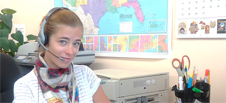Travel Tips
 What type of research should I do before I travel?
What type of research should I do before I travel?
It’s important to do some pre-travel research and learn as much as you can about your destination. The following tips will help you prepare:
- Check the weather forecast for your travel destination, so you can plan accordingly.
- Check with the U.S. State Department concerning safety warnings for U.S. tourists at your destination.
- Find out if you will need a passport to enter the country. Make sure your passport is up to date and valid. Some countries will not let you in if your passport will expire within six months of your return trip.
- Determine if you will need any visas to enter the country.
- Check to see what other type of paperwork and documentation you will need to travel.
- Research diseases common to the area you’ll be visiting and take actions to prevent exposure.
- Find out what types of vaccinations you will need to enter the country; in addition, there may be medications you’ll need to take before, during and even after your trip.
- Look up the type of electrical outlets the country uses, since you may need a special converter or adapter to use your electrical appliances.
- Check your own medical coverage to see what type of coverage you’ll have when away from home. Consider purchasing trip insurance.
- Do some research about the costs of local items, so you can set your budget. Don’t forget to budget for taxes and tipping; many governments charge high taxes for travel-related services.
- Check the financial section of your newspaper, which will likely post exchange rates, since checking in advance can give you an idea of how much you’ll need to budget for daily epenses.
- Do some research with U.S. Customs to find out what you can take with you and what you may bring back.
- Build some basic language skills in the local language.
- Check the dates of local major holidays, since services may be limited on those dates.
- If you plan on driving, investigate the local road conditions, laws and other driving requirements.
- Most of the world uses the metric system, so try to become familiar with this system. 1 kilometer = .62 miles, so 100 kilometers per hour = 62 miles per hour.

- Research wet and dry seasons, or other possible weather conditions that may affect your holiday. If you are using a travel agent, make sure that you ask about this, if they haven’t already provided this information.
- Ask your agent or other sources to find out whether the hotel or even the destination has any work going on.
- If you are travelling to an area that may be considered a “hot zone” (possibly dangerous), then check with your insurance company to verify whether you will be covered in case something goes wrong. If they do not and you still want to travel, then find one that will.
- If your itinerary may change, ensure that there are absolutely no charges if you alter the dates or times of flights. Ask your agent to fully explain any restrictions on your ticket to ensure that they meet with your needs.
- If you are flying with one of the alliances, such as Star or One World, ask your agent what plane is going to be used.
- If you are buying a plane ticket on a certain airline and have been told that due to these code sharing agreements you will actually be flying on another airline, then check if you can buy any cheaper tickets on the actual airline that you will be flying. Believe it or not, code share does not mean price share and you may be able to find cheaper rates.
- Use a credit card, if possible. This gives you the comfort of official records, and also additional insurance that comes with the card.















